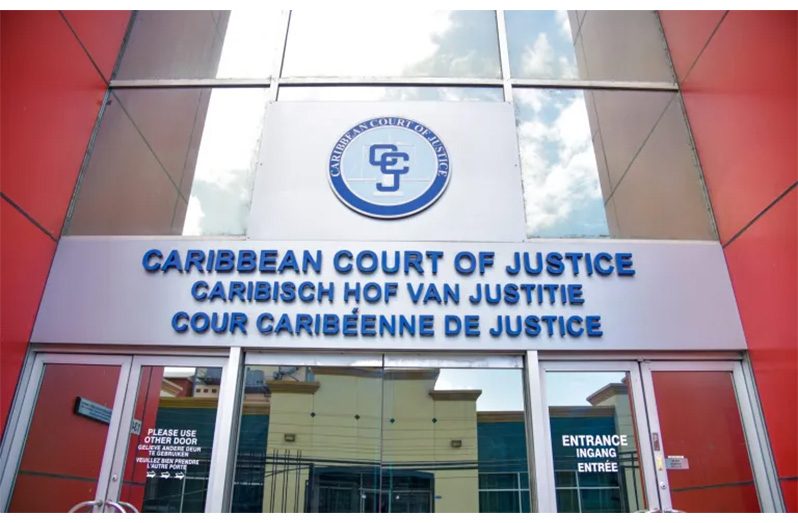GUYANA featured prominently in the Caribbean Court of Justice (CCJ) Annual Report for 2023/2024, which was released on Friday last. The report recorded a four per cent increase in new matters filed compared to the previous year, with Guyana contributing six of the 26 appellate cases. This placed it on par with Belize and just behind Barbados, which filed nine cases.
Dominica and Saint Lucia filed one and four cases, respectively. The cases were evenly split between criminal and civil matters. Among them was a high-profile appeal from Guyana that saw the regional court hearing novel matters in its Appellate Jurisdiction.
In Ramon Gaskin v Minister of Natural Resources and Others [2024] CCJ 14 (AJ) GY, the CCJ addressed environmental regulation in the oil and gas sector under Guyana’s Petroleum Act.
The case, which originated from the Court of Appeal of Guyana, marked the CCJ’s first detailed interpretation of the Act as it relates to environmental oversight. Gaskin challenged the issuance of a Petroleum Production Licence (PPL) granted to ExxonMobil Guyana Limited, CNOOC Petroleum Guyana Limited and Hess Guyana Exploration Limited.
He argued that each of the companies involved in the Stabroek Block joint venture should have acquired separate environmental permits prior to receiving the PPL. The High Court of Guyana had dismissed the claim after a delay of 366 days in delivering its judgment.
The Court of Appeal upheld the decision of the High Court, stating that the environmental permit was tied to the Liza 1 Project and that Exxon, as the operator, could comply with the environmental obligations.
The CCJ, in a judgement delivered by Justice Winston Anderson, who now serves as President of the Court, upheld the rulings of the lower courts. The Court held that the granting of environmental authorisation was a condition precedent to the granting of a PPL. Environmental authorisation must be given for the undertaking of a project and the Environmental Protection Agency must be convinced that a developer can fulfil their role and responsibilities and comply with the terms and conditions of the environmental permit.
As the sole operator, ExxonMobil alone was able to comply with the obligations of the developer and was subject to extensive environmental obligations, which were extended to Hess and CNOOC through joint and several liability.
The grant of the PPL to CNOOC and Hess did not render the licence invalid for four reasons (i) the Act’s requirements were satisfied with Exxon being granted the environmental permit; (ii) the grant was consistent with oil and gas industry practice as Exxon the sole operator operated as representative of the joint venture; (iii) there was joint and several liability between the Companies for environmental harm; and (iv) there was no increased risk of harm to the environment under either the precautionary principle or the avoidance principle by the inclusion of Hess and CNOOC in the PPL. Justice Anderson concluded that there was no basis for finding that the Minister of Natural Resources acted unlawfully.
The Annual Report also noted that the CCJ held a total of 45 sittings during the reporting period, which ran from August 1, 2023, to July 31, 2024. These included six case management conferences, 25 hearings, and 14 judgement deliveries. A large majority, 80 per cent, of these sittings were held virtually. Hybrid and in-person sessions accounted for seven per cent and 13 per cent, respectively.
The report showed that the CCJ’s Appellate Jurisdiction continued to be the more frequently used avenue. It received 26 new matters in the past year, up from 25 in 2022/2023. These included 11 applications for special leave and 15 appeals.
In contrast, the report emphasised that the court’s Original Jurisdiction remained underutilised. Only one new matter was filed during the reporting period, and it came from Trinidad and Tobago. Dominica, which had filed two matters in the previous year, did not file any in 2023/2024.
Approximately 58 per cent of the matters were disposed of within six months of filing. The vast majority of matters (approximately 97 per cent) were disposed of within one year of filing. Only one case fell outside of this period.
The clearance rate reflects a rate of 127 per cent for disposed matters against new matters. The first half of the Court year, August 2023 to January 2024, was the busiest with the highest numbers of new filings and disposals.
The clearance rate for disposed matters compared to new filings was 127 per cent. The majority of new filings and case disposals occurred in the first half of the Court year (August 2023 to January 2024). By the end of the Court year, only 10 cases remained pending, all of which had been filed less than one year earlier
Released under the theme “Advancing Access to Justice… Refining and Innovating for Impact,” the report underscored the CCJ’s commitment to innovation, access, and responsiveness.
“The CCJ will not be deterred from advancing access to justice in the region. Never will our determination to continually refine our processes and to embrace cutting-edge innovations ever be blunted,” said Justice Adrian Saunders, the CCJ’s immediate past president.
The CCJ was inaugurated in Port of Spain, Republic of Trinidad and Tobago April 16, 2005, and presently has a bench of six judges presided over by CCJ President, Justice Winston Anderson.
The CCJ has an Original and an Appellate Jurisdiction and is effectively, therefore, two courts in one. In its Original Jurisdiction, it is an international court with exclusive jurisdiction to interpret and apply the rules set out in the Revised Treaty of Chaguaramas (RTC) and to decide disputes arising under it.
The RTC established the Caribbean Community (CARICOM) and the CARICOM Single Market and Economy (CSME).
In its Original Jurisdiction, the CCJ is critical to the CSME, and all 12 Member States which belong to the CSME (including their citizens, businesses, and governments) can access the Court’s Original Jurisdiction to protect their rights under the RTC.
In its Appellate Jurisdiction, the CCJ is the final court of appeal for criminal and civil matters for those countries in the Caribbean that have altered their national Constitutions to enable the CCJ to perform that role.
At present, five states access the Court in its Appellate Jurisdiction, these being Barbados, Belize, Dominica, Guyana, and Saint Lucia.
However, by signing and ratifying the agreement establishing the CCJ, Member States of the Caribbean Community have demonstrated a commitment to making the CCJ their final court of appeal.



.jpg)








